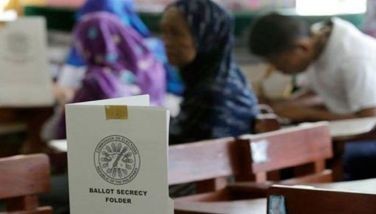Japan pledges $1-B development aid
December 11, 2006 | 12:00am
Japan committed more than $1 billion in investments, loans and grants to the Philippines during Prime Minister Shinzo Abe’s two-day visit here.
Ambassador to Tokyo Domingo Siazon said Filipino and Japanese officials discussed the infusion of some $450 million in the power sector, development assistance for Mindanao, and a loan package.
"We were discussing a total of $1.3 billion, if you add up everything," he said.
Siazon was in Manila for Abe’s visit.
President Arroyo and Abe witnessed the signing of the agreement on a $72.3-million project involving riverbank improvement and flood control structures for the entire stretch of the Pasig-Marikina River.
At a press conference, Abe said his government will continue to provide assistance for the development of Mindanao, where Japan has extended P31 million in grant for 12 projects for education, water supply and livelihood.
Abe said he was happy to see that Japanese assistance to the Philippines has helped improve the lives of Filipinos through a railway project funded by Japan.
He was told that Filipino commuters would benefit from the project when he rode one of the third-generation trains of the Light Rail Transit Authority with Mrs. Arroyo last Saturday, he added.
Japan will continue to support the Philippines’ development, Abe said.
However, Siazon said Japan has expressed concern over human rights violations and political killings, which the Japanese parliament might raise as an issue in the grant of assistance to the Philippines.
"If there are objections in parliament, of course there (will be) problems," he said.
The matter had been clarified with Japanese authorities, he added.
Siazon said the Philippines had explained that the government was tolerating human rights violations and political killings, and that the perpetrators will be prosecuted.
There was only one incident in the Agno River project in Pangasinan that made the Japanese pay attention to the issue, and that the killing was done by leftists, he added.
Siazon said overall, the Japanese "poured in" a lot of assistance to the Philippines during the visit of Abe.
Abe would like the Philippines and Japan to have better political and economic relations, he added.
Siazon said Abe batted for the early ratification of the Japan-Philippines Economic Partnership Agreement by assuring that Japan would not make the Philippines a dumping ground of toxic wastes.
Abe told the Filipino officials that Japan would not violate international and Philippine laws banning the transport of hazardous and toxic materials, he added.
Abe flew out during a steady drizzle in Metro Manila early yesterday morning.
He was sent off by Vice President Noli de Castro and Siazon at the Ninoy Aquino International Airport Terminal I.
Abe left aboard a Japan Air Force plane at around 7 a.m. yesterday. –Aurea Calica, Rainier Allan Ronda
Ambassador to Tokyo Domingo Siazon said Filipino and Japanese officials discussed the infusion of some $450 million in the power sector, development assistance for Mindanao, and a loan package.
"We were discussing a total of $1.3 billion, if you add up everything," he said.
Siazon was in Manila for Abe’s visit.
President Arroyo and Abe witnessed the signing of the agreement on a $72.3-million project involving riverbank improvement and flood control structures for the entire stretch of the Pasig-Marikina River.
At a press conference, Abe said his government will continue to provide assistance for the development of Mindanao, where Japan has extended P31 million in grant for 12 projects for education, water supply and livelihood.
Abe said he was happy to see that Japanese assistance to the Philippines has helped improve the lives of Filipinos through a railway project funded by Japan.
He was told that Filipino commuters would benefit from the project when he rode one of the third-generation trains of the Light Rail Transit Authority with Mrs. Arroyo last Saturday, he added.
Japan will continue to support the Philippines’ development, Abe said.
However, Siazon said Japan has expressed concern over human rights violations and political killings, which the Japanese parliament might raise as an issue in the grant of assistance to the Philippines.
"If there are objections in parliament, of course there (will be) problems," he said.
The matter had been clarified with Japanese authorities, he added.
Siazon said the Philippines had explained that the government was tolerating human rights violations and political killings, and that the perpetrators will be prosecuted.
There was only one incident in the Agno River project in Pangasinan that made the Japanese pay attention to the issue, and that the killing was done by leftists, he added.
Siazon said overall, the Japanese "poured in" a lot of assistance to the Philippines during the visit of Abe.
Abe would like the Philippines and Japan to have better political and economic relations, he added.
Siazon said Abe batted for the early ratification of the Japan-Philippines Economic Partnership Agreement by assuring that Japan would not make the Philippines a dumping ground of toxic wastes.
Abe told the Filipino officials that Japan would not violate international and Philippine laws banning the transport of hazardous and toxic materials, he added.
Abe flew out during a steady drizzle in Metro Manila early yesterday morning.
He was sent off by Vice President Noli de Castro and Siazon at the Ninoy Aquino International Airport Terminal I.
Abe left aboard a Japan Air Force plane at around 7 a.m. yesterday. –Aurea Calica, Rainier Allan Ronda
BrandSpace Articles
<
>
- Latest
- Trending
Trending
Latest
Trending
Latest
Recommended





























